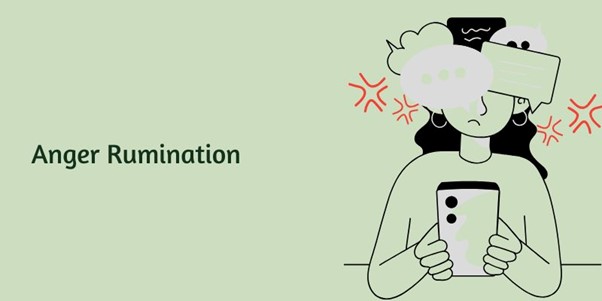
Rumination: Definition, Causes, Signs, Example, Impact, How to Overcome?
Have you ever found yourself replaying the same thought over and over, unable to let it go? Maybe it’s a mistake you made, something someone said, or a worry about the future.
This mental habit, rumination, is more common than you might think.
While reflecting on events to learn or prepare is natural, rumination takes it a step further. It traps you in a loop of repetitive thinking that doesn’t lead to solutions but instead fuels stress, sadness, or anxiety.
Rumination often feels like a problem-solving process, but it rarely provides clarity or closure. Instead, it can amplify negative emotions and make it harder to focus on the present.
Understanding rumination is key to breaking free from its grip. Why do we ruminate? What are the signs that it’s affecting our mental health? And most importantly, how can we stop the cycle?
In this blog, we’ll explore the meaning of rumination, what causes it, how to spot the signs, and its effects on your emotional well-being.
We’ll also examine real-life examples and share practical strategies for regaining control of your thoughts and leading a calmer, more balanced life.
What is Rumination?

Rumination is a cycle of repetitive thoughts in which individuals repeatedly focus on a problem or negative experience without moving toward a resolution.
It’s like mentally getting stuck in a loop—constantly analyzing the same issue, often without any progress.
People who ruminate tend to dwell on past mistakes, fears about the future, or unresolved issues, which keeps them from finding practical solutions or emotional closure.
Unlike constructive emotional processing, which helps individuals work through feelings and reach a sense of understanding, rumination often leaves people feeling trapped in their emotions, unable to break free from the cycle of negative thinking.
When done in a healthy way, emotional processing involves acknowledging and expressing emotions to gain insight and make sense of experiences. This process allows for healing and moving forward.
Rumination, however, is destructive. It involves fixating on the problem itself rather than working through it. It leads to increased negative emotions and a sense of helplessness, making it harder to find resolution or relief.
Key Characteristics of Rumination
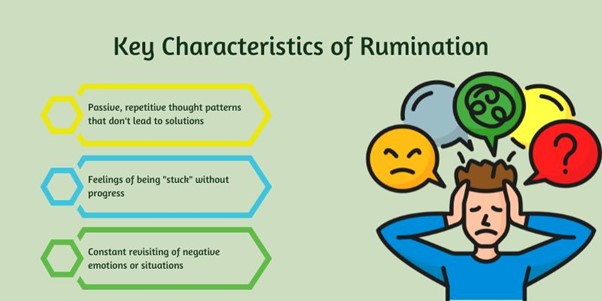
Identifying rumination is essential for proper management. Here are the key characteristics that can help you better understand rumination.
1. Passive, repetitive thought patterns that don’t lead to solutions
Rumination often involves passive thinking, where the mind circles the same negative thoughts or scenarios.
It’s different from problem-solving, which focuses on actively seeking solutions. With rumination, thoughts become repetitive and endless, creating a mental loop with no exit.
The person can’t seem to move past the issue, constantly analyzing the same problem but never finding a way to fix it. This lack of forward movement can make it feel trapped in a mental maze with no clear path.
2. Feelings of being “stuck” without progress
A sign of rumination is the overwhelming feeling of being stuck. When someone is ruminating, they often feel like they can’t escape their thoughts.
Even though they may consciously want to move on or let go of the issue, their mind keeps pulling them back into the same negative loop.
This creates a sense of helplessness as if there’s no way out of their emotional or mental state. It can be frustrating, leaving them feeling powerless to change their situation or emotional state.
3. Constant revisiting of negative emotions or situations
Rumination often involves repeating negative emotions or situations. These could be a past argument, a failure, a mistake, or a fear of something that might happen in the future.
The constant revisiting of these emotions intensifies the negative feelings tied to them—anger, sadness, regret, or anxiety.
Instead of processing the emotions and moving on, the person gets caught up in the negative feelings, magnifying them with each repetition.
The more someone ruminates, the more those emotions may dominate their thoughts, preventing them from finding peace or closure. This cycle makes it harder to focus on the present or look forward to the future.
How Does Rumination Work?
Rumination often begins with a genuine desire to solve a problem or understand a difficult situation.
When something unsettling or troubling happens, our instinct is to reflect on it to resolve it.
People typically think through issues with the hope of concluding, making sense of the experience, or figuring out how to handle the situation in the future.
However, what starts as an active attempt to solve a problem can quickly spiral into a passive and unproductive process.
Instead of finding clarity, the individual begins to replay the same thoughts over and over without any real progress toward a solution. The focus shifts away from resolution and becomes about endlessly analyzing the issue.
In many cases, rumination is triggered by strong emotional responses like frustration, anxiety, or feelings of being threatened.
When people experience situations that cause anger, stress, or embarrassment, they may start to fixate on those feelings to make sense of what happened or to find a way to “fix” the situation.
This can happen after a conflict with a friend, a missed opportunity at work, or even a hurtful comment from someone.
Instead of moving past the event or learning from it, the mind fixates on every detail, fueling negative emotions and creating a sense of urgency to resolve the issue—even though the more you focus on it, the further you are from finding any resolution.
The harm of rumination is that it rarely leads to resolution, despite the initial intention to solve the problem. Instead of progressing, the person becomes trapped in a loop of negative thinking.
This can have several damaging effects: it increases stress, keeps negative emotions alive, and can even worsen mental health issues like anxiety or depression.
Rumination keeps the mind focused on the problem without taking steps to solve it. It prevents emotional growth and keeps the individual stuck in a cycle of distress.
Signs of Rumination
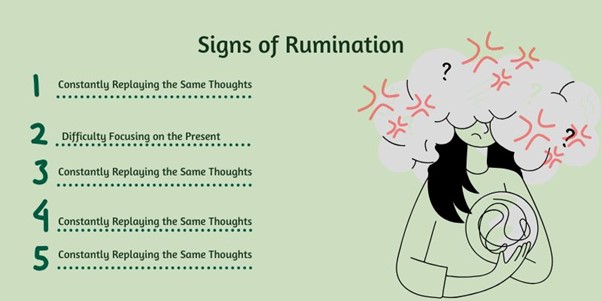
Rumination can be subtle at first, and many people may not even realize they’re stuck in a cycle of repetitive thinking.
However, sure signs can indicate that rumination is taking over. These signs often manifest as behaviors, emotional states, or mental patterns that persist over time.
Recognizing them early can be a key step in breaking the cycle. When you notice these signs, you must take a step back and assess whether you’re simply reflecting on a situation or trapped in a cycle that isn’t leading to any resolution or emotional growth.
1. Constantly Replaying the Same Thoughts
One of the most obvious signs of rumination is constantly replaying the same thoughts or situations. This happens when you cannot stop thinking about a particular event, conversation, or feeling.
For example, you may revisit an argument you had, imagining all the things you could’ve said differently, or dwell on a mistake you made.
Each time you replay it, the thoughts become more intense, and the emotional charge of the situation may grow.
You’re not problem-solving or learning from the experience; you’re simply stuck, continuously going over the exact details without reaching any new insight or conclusion. This loop keeps you tethered to the past, preventing you from moving forward.
2. Difficulty Focusing on the Present
When you ruminate, your mind is often preoccupied with the past or future, leaving little room for the present moment. This can manifest as difficulty concentrating on tasks at hand, whether at work, home, or social situations.
You may find yourself daydreaming about what went wrong in a past interaction or what might happen in the future instead of being engaged with what’s happening now.
This inability to focus on the present is frustrating because it prevents one from experiencing life fully in the moment, making everything feel disconnected.
When one is stuck in rumination, the present becomes less vivid, and enjoying daily activities or relationships becomes difficult.
3. Feeling Overwhelmed by Negative Emotions
Another sign of rumination is feeling overwhelmed by negative emotions, such as anxiety, sadness, regret, or anger.
When ruminating, these emotions are often magnified because your mind is locked in a cycle of focusing on them.
For example, after a stressful event, instead of processing the feelings and moving on, you may think, “Why did that happen to me?” or “I can’t believe I said that,” which just makes you feel worse.
Each time you revisit the negative experience, the emotions feel more intense and harder to manage. Rumination amplifies these feelings, creating a constant emotional burden that’s difficult to shake.
4. Physical Tension or Restlessness
Rumination isn’t just a mental process—it also takes a physical toll on the body. When you ruminate, it’s common to experience physical symptoms like muscle tension, restlessness, or a racing heart.
These symptoms are often a result of the stress and anxiety that rumination creates.
Your mind keeps triggering the “fight-or-flight” response, even if you’re not physically facing a threat, which can increase cortisol levels, the stress hormone.
Over time, this can contribute to feeling physically drained, tense, or restless as your body reacts to the mental strain of endless thinking.
5. Impaired Decision-Making
Ruminating often leads to a breakdown in decision-making because you’re too focused on the problem rather than considering practical solutions.
When you’re stuck in a loop of repetitive thoughts, your mind is not in a space to logically assess options or move toward action.
Instead, you might find yourself second-guessing every choice or becoming paralyzed by fear of making the wrong decision.
This indecisiveness is rooted in rumination. You’re so preoccupied with the consequences of your actions or the emotional fallout of past mistakes that you can’t make clear, forward-thinking decisions.
Rumination clouds judgment, making it difficult to move past the situation or make positive changes.
Causes of Rumination
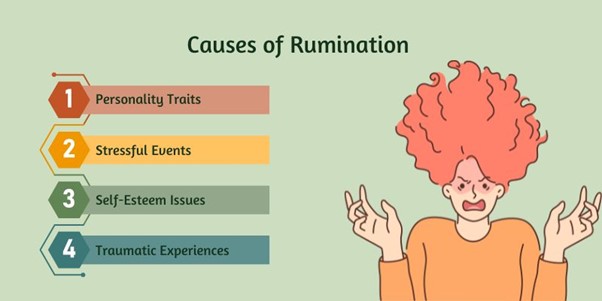
Rumination doesn’t happen randomly; it’s often triggered by specific factors related to an individual’s personality, life experiences, and emotional health.
Understanding the causes of rumination can help individuals identify their triggers and address the root of the problem.
Whether it’s certain personality traits, stressful life events, low self-esteem, or unresolved trauma, each cause contributes to the development of rumination in different ways. Let’s explore these causes in more detail.
1. Personality Traits – Perfectionism and Neuroticism

Certain personality traits can make an individual more prone to rumination. Perfectionism—the desire to meet high standards and avoid mistakes at all costs—can trigger rumination.
Perfectionists often dwell on their perceived failures or imperfections, replaying mistakes in their minds repeatedly.
Even minor errors may feel catastrophic, leading to endless cycles of self-criticism and anxiety.
Similarly, neuroticism, a personality trait characterized by a tendency to experience negative emotions like anxiety, sadness, and irritability, is closely linked to rumination.
People high in neuroticism are more likely to overanalyze situations and stress over things they cannot control.
Their heightened emotional reactivity makes them prone to negative thinking patterns, as they constantly focus on potential problems or worst-case scenarios.
2. Stressful Events – Job Loss, Breakups, etc.
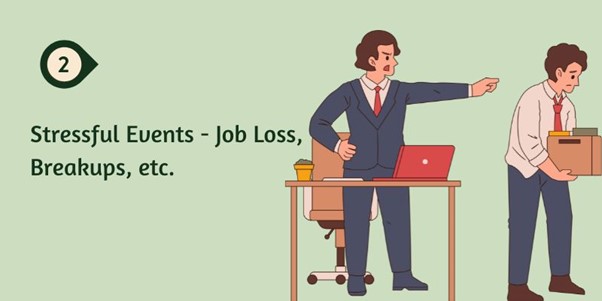
Stressful life events are some of the most common triggers for rumination. Significant changes, such as job loss, breakups, or financial difficulties, can leave people uncertain and overwhelmed.
To regain control or understand what went wrong, individuals may replay the event in their minds, attempting to find answers or solutions. However, this thinking often leads to rumination rather than resolution.
The stress associated with these events can cause people to focus excessively on their feelings of loss, failure, or hurt, preventing them from moving forward.
Rumination, in this case, can prolong emotional distress, making it harder to adjust to the new situation and find a path to healing.
3. Self-Esteem Issues and Fear of Uncertainty

Low self-esteem and a fear of uncertainty can also fuel rumination. Individuals with a poor sense of self-worth may constantly criticize themselves or question their abilities, leading to a cycle of negative thinking.
For example, someone with low self-esteem might ruminate over social interactions, worrying about what others think of them or whether they made a mistake.
Additionally, people with an intense fear of uncertainty are often driven to overanalyze situations to predict and control outcomes.
This fear can make it difficult to accept ambiguity or mistakes, and instead, individuals get stuck in a loop of “what-ifs” and imagined scenarios, which further escalates anxiety and rumination.
4. Traumatic Experiences and Unresolved Stress
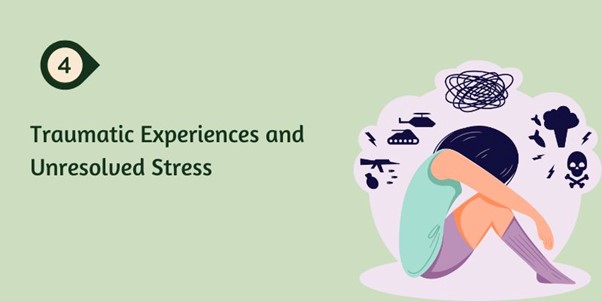
Traumatic experiences and unresolved stress can also trigger rumination. When people experience trauma, whether from a single event like an accident or ongoing stress like abuse or neglect, the emotional scars can cause the mind to revisit the painful memories repeatedly.
The brain tries to make sense of the trauma, but because it hasn’t been fully processed, it often gets stuck in a cycle.
Similarly, unaddressed ongoing stress—whether from work, family, or health problems—can lead to rumination.
Without healthy coping strategies, individuals may continuously dwell on the stressors in their lives, intensifying negative emotions and preventing emotional healing.
The mind becomes preoccupied with unresolved issues, hindering the ability to move forward or find closure.
Example of Rumination
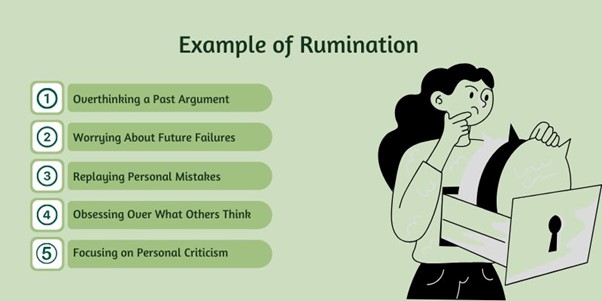
Rumination often takes the form of repetitive, circular thinking. While everyone experiences occasional reflection on past events, rumination occurs when these thoughts become excessive and unproductive.
The following examples show how people can become trapped in their thoughts, continuously rethinking problems without resolution, and how this negatively impacts their emotional well-being.
Example # 1: Overthinking a Past Argument
One common example of rumination is overthinking a past argument. After a disagreement with a friend, family member, or coworker, a person might replay the conversation, thinking about what was said, how it was said, and how they could have responded differently.
They may even imagine alternative outcomes or rehearse different lines of defense. This process can continue for hours or even days, intensifying frustration, regret, or self-doubt.
The person may become fixated on their role in the argument or feel an ongoing need for resolution, but instead of having a productive conversation or seeking closure, they get stuck in the emotional aftermath.
Rather than moving past the event, they continuously relive it, which increases anger or sadness without progressing toward reconciliation.
Example # 2: Worrying About Future Failures
Another example is worrying about future failures, a form of rumination where individuals obsess over potential outcomes in a way that prevents them from acting.
For instance, someone preparing for a job interview might ruminate on everything that could go wrong—getting answers, being judged harshly, or not getting the position.
Instead of focusing on preparing or staying present at the moment, they constantly replay worst-case scenarios in their mind. This fear of failure can lead to procrastination or avoidance of action, making the situation even more overwhelming.
Despite having no certainty about the future, the person’s mind remains stuck in these negative projections, causing unnecessary anxiety and stress.
Example # 3: Replaying Personal Mistakes or Regrets
Another example of rumination is replaying personal mistakes or regrets. This could involve revisiting a poor decision, missed opportunity, or something a person feels guilty about.
For example, someone might constantly ruminate over a decision they made years ago—such as turning down a job offer, missing out on an important event, or saying something hurtful to a loved one.
Even though the situation has long passed, they may repeatedly ask themselves why they made that choice, what would have happened if they acted differently, or how they could have done better.
This constant focus on past mistakes prevents them from moving forward. It also prevents personal growth, as changing the past is challenging. This focus often leads to regret, shame, and frustration without offering tangible benefits or solutions.
Example # 4: Obsessing Over What Others Think
Rumination can also arise when someone becomes overly concerned with what others think of them.
For instance, after a social event or interaction, a person might repeatedly analyze their behavior, worrying about how they were perceived.
They might obsess over whether they said the right thing, looked awkward, or came across negatively.
This kind of thinking can be especially pronounced for people with low self-esteem or social anxiety.
Instead of simply accepting that not everyone will notice or judge their actions, they get stuck in the loop of questioning themselves, which only increases their insecurity and anxiety.
This form of rumination can severely impact self-confidence and make social situations feel draining, as the individual is constantly overanalyzing their interactions, leading to a cycle of self-doubt.
Example # 5: Focusing on Personal Criticism or Negative Feedback
Finally, focusing on personal criticism or negative feedback is a common ruminative thought pattern. After receiving criticism at work, school, or in a personal relationship, an individual may fixate on the negative feedback for days or weeks.
They may replay the criticism, wondering if it was justified, how they could have avoided it, or what it says about their abilities or character.
This rumination is especially common for perfectionists who struggle to accept any form of failure or imperfection.
Even constructive feedback can become distorted in their minds, causing them to dwell on it to the point where they feel demoralized or unworthy.
Instead of using feedback as an opportunity for growth, they become trapped in a cycle of self-criticism that negatively affects their confidence and ability to improve.
Impact of Rumination
Rumination affects more than just a person’s thoughts—it can significantly impact emotional and physical well-being.
While reflecting on challenges can sometimes lead to insight or growth, rumination traps individuals in repetitive and unproductive thinking cycles.
Over time, this can have severe consequences for mental health, relationships, and overall quality of life.
Below, we explore the specific ways rumination can harm mental health, touching on its connection to anxiety, depression, eating disorders, and other conditions, as well as its broader impact on general health.
Mental Health Effects
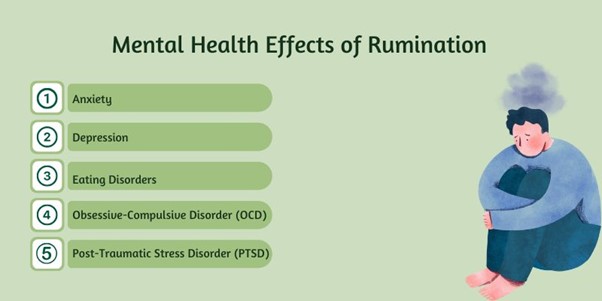
Rumination can severely impact the mental health of an individual. Here are the main effects of rumination on mental health.
1. Anxiety

Rumination is a well-documented risk factor for anxiety, often causing individuals to worry about future events excessively.
Rather than focusing on actionable solutions, people may replay worst-case scenarios, amplifying feelings of fear and uncertainty.
Over time, this habit of overthinking can increase chronic anxiety levels, making it harder to stay present or relax.
2. Depression

Rumination and depression often go hand-in-hand. By dwelling on negative thoughts, individuals can become trapped in a cycle of sadness, hopelessness, and self-criticism.
Research shows that rumination not only contributes to the onset of depression but also prolongs depressive episodes by keeping individuals stuck in unhelpful thinking patterns that reinforce their low mood.
3. Eating Disorders

Rumination is common in individuals struggling with eating disorders, where obsessive thoughts about food, body image, and dieting dominate their mental space.
This fixation can lead to unhealthy eating behaviors, such as bingeing, purging, or extreme calorie restriction, as individuals try to “correct” perceived flaws in their appearance.
4. Obsessive-Compulsive Disorder (OCD)
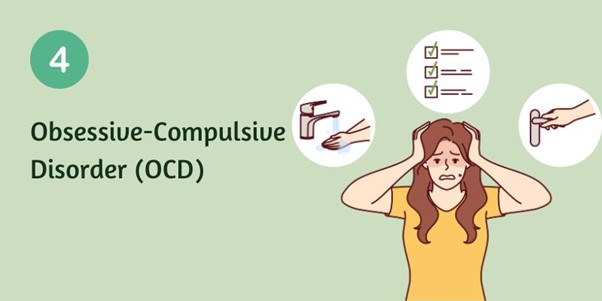
Intrusive thoughts are a hallmark of OCD, and rumination often plays a role in obsessive thinking.
For example, individuals may replay intrusive thoughts over and over, leading to compulsive behaviors designed to reduce anxiety. Instead of resolving the anxiety, this cycle reinforces both rumination and compulsions.
5. Post-Traumatic Stress Disorder (PTSD)
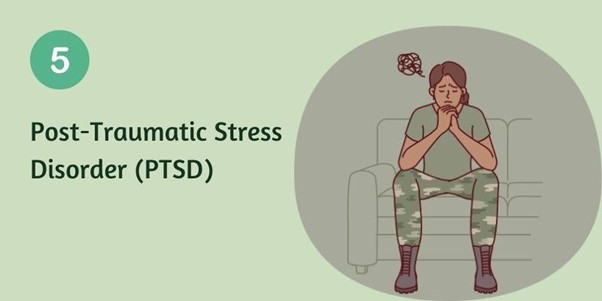
Rumination can exacerbate PTSD symptoms by causing individuals to focus on past traumatic events repeatedly. This repetitive thinking keeps the trauma fresh in their minds, making it difficult to process and heal.
Rumination can also worsen flashbacks, hypervigilance, and emotional distress associated with PTSD.
General Health Risks
In addition to mental health, rumination poses risks to overall health. The constant stress caused by overthinking can lead to physical exhaustion, poor decision-making, and chronic stress.
These issues can, in turn, contribute to health problems such as high blood pressure, weakened immunity, and cardiovascular diseases. Additionally, ruminating individuals may struggle with sleep, compounding the negative effects on their health.
By understanding the far-reaching impact of rumination, individuals can begin to recognize the importance of breaking this habit and seeking healthier coping mechanisms to improve mental and physical well-being.
How to Overcome Rumination?
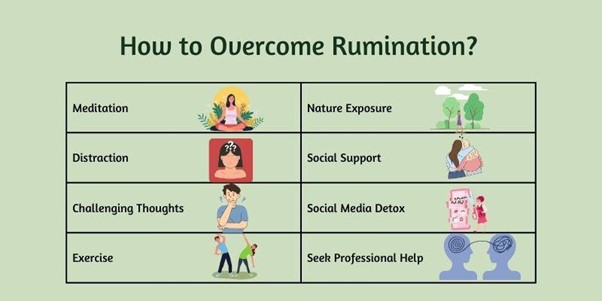
Overcoming rumination requires intentional effort and strategies that help break the repetitive, negative thinking cycle.
Rumination often feels automatic, but with the right tools, it is possible to redirect the mind, develop healthier thought patterns, and reduce its impact on mental health.
Strategies such as mindfulness, physical activity, and seeking social support can effectively manage rumination, while professional interventions may be necessary for severe or chronic cases.
Below are key approaches to overcoming rumination, explained in detail.
1. Meditation

Meditation is a powerful tool for calming the mind and redirecting thoughts. By focusing on the present moment, individuals can interrupt the cycle of repetitive thinking and develop greater awareness of their mental patterns.
Practices like mindfulness meditation encourage observing thoughts without judgment, which helps individuals recognize rumination as it arises and gently refocus their attention.
Over time, meditation trains the brain to respond to stress more calmly and promotes emotional resilience.
2. Distraction
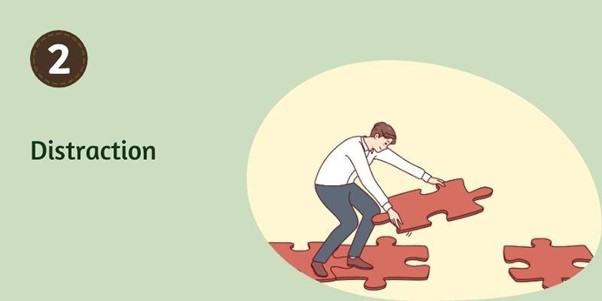
Engaging in activities that require focus can break the cycle of rumination. Reading, solving puzzles, painting, or watching a movie can redirect attention and give the mind a much-needed break.
Distraction is not about avoiding problems but creating mental space to return to challenges with a fresh perspective and reduced emotional intensity.
3. Challenging Thoughts

Challenging negative or irrational thoughts is an effective cognitive strategy. Reminding yourself that thoughts are not facts can reduce your emotional weight.
For instance, instead of thinking, “I always fail,” try reframing it as, “I have made mistakes, but I’ve also succeeded in many areas.”
Writing down and questioning irrational beliefs can also help individuals see their situation more objectively.
4. Exercise

Physical activity is beneficial for the body and a proven method for clearing the mind. Exercise reduces stress hormones, boosts endorphins, and improves mood, making it easier to manage intrusive thoughts.
Even a short walk or light stretching can break the cycle of rumination by shifting focus and reducing mental tension.
5. Nature Exposure

Spending time in nature has been shown to reduce repetitive negative thoughts and lower stress.
A walk in the park, a hike in the woods, or simply sitting near greenery can improve mental clarity and emotional well-being.
Studies suggest that exposure to natural environments helps calm the mind and foster a sense of peace, offering relief from rumination.
6. Social Support

Talking to trusted friends or family members can provide emotional relief. Sharing your thoughts allows you to process emotions in a safe space without getting stuck in the cycle of rumination.
Social connections also offer perspective, reminding you that you’re not alone and helping you approach challenges more constructively.
7. Social Media Detox

Social media can fuel rumination, especially when exposure to negativity, comparisons, or triggering content is constant.
Taking breaks or setting boundaries for social media use can significantly reduce emotional triggers and improve focus on real-life connections and activities.
8. Seek Professional Help

If rumination becomes overwhelming or chronic, professional help may be necessary. Cognitive-behavioral therapy (CBT) is particularly effective for breaking rumination cycles.
A therapist can help identify thought patterns, teach strategies for managing them, and guide you toward healthier coping mechanisms.
Seeking help is crucial when rumination affects relationships, work, or overall mental health.
Implementing these strategies can help reduce rumination and improve emotional resilience, paving the way for a healthier and more balanced mindset.
Frequently Asked Questions (FAQs)
Is rumination a mental disorder?
Rumination is not classified as a standalone mental disorder. Still, it is a symptom or contributing factor in various conditions, such as depression, anxiety, and OCD.
Chronic rumination can negatively impact mental health and may require professional intervention.
Is rumination like overthinking?
Rumination and overthinking are similar but not identical. Both involve repetitive thinking, but rumination focuses on past events and unresolved problems, often causing emotional distress, while overthinking can include broader concerns about decisions or future scenarios.
Conclusion
Rumination is a common mental habit that can affect anyone, but understanding its causes, signs, and impact is the first step toward overcoming it.
While it may seem like a natural way to process emotions or solve problems, rumination often traps individuals in cycles of negative thinking that cause more harm than good.
From its role in mental health conditions like anxiety and depression to its effects on overall well-being, rumination highlights the importance of breaking these unproductive thought patterns.
Thankfully, rumination is not irreversible. With mindfulness, intentional strategies, and support, individuals can regain control over their thoughts and reduce the grip of rumination.
Whether through meditation, exercise, spending time in nature, or seeking help from a mental health professional, there are practical and effective ways to redirect the mind toward healthier coping mechanisms.
It’s important to remember that progress takes time and patience. If rumination feels overwhelming or persistent, seeking professional guidance can make a significant difference.
Letting go of unhelpful thoughts and focusing on constructive actions ease mental strain. It enhances emotional resilience and overall quality of life.





Responses